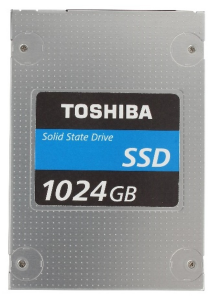 Toshiba Corporation’s Semiconductor & Storage Products Company today announced three distinct families of PCIe (Peripheral Component Interconnect Express) solid state drive (SSD) products using NVMe (Non-Volatile Memory Express) protocol, targeted for various applications including high performance notebooks; thin notebooks, 2-in-1/convertible notebooks and tablets; and server and storage applications. All three SSD product lines are optimized for high performance and low latency and utilize the PCIe interface, which provides point-to-point links with the processor, reducing system bottlenecks. Each SSD family is designed for its target segment with capacity, optimized form factor, and security capabilities. Samples of the Toshiba’s newest lines of NVMe, PCIe SSDs will be available from the fourth quarter (Oct. to Dec.) of 2015.
Toshiba Corporation’s Semiconductor & Storage Products Company today announced three distinct families of PCIe (Peripheral Component Interconnect Express) solid state drive (SSD) products using NVMe (Non-Volatile Memory Express) protocol, targeted for various applications including high performance notebooks; thin notebooks, 2-in-1/convertible notebooks and tablets; and server and storage applications. All three SSD product lines are optimized for high performance and low latency and utilize the PCIe interface, which provides point-to-point links with the processor, reducing system bottlenecks. Each SSD family is designed for its target segment with capacity, optimized form factor, and security capabilities. Samples of the Toshiba’s newest lines of NVMe, PCIe SSDs will be available from the fourth quarter (Oct. to Dec.) of 2015.
High Performance Notebooks: The XG3 family of SSDs is the industry’s highest capacity (1024GB) client NVMe SSD available in M.2 Type 2280 form factor and optimally designed for high performance notebooks, 2-in-1 PCs and all-in-one PCs. The XG3 in M.2 Type 2280 form factor supports up to four lanes of PCIe 3.1, which has a maximum interface bandwidth more than six times that of SATA 6Gbits/s. XG3 is also the industry’s first NVMe SSD available in 2.5-inch SATA express form factor. The XG3 SSD family is equipped with Toshiba’s proprietary QSBCTM (Quadruple Swing-By Code) error-correction technology, a highly efficient error correction code (ECC), which helps protect customer data from corruption, improves reliability, and extends the life of Toshiba SSDs. Engineered for power efficiency, the XG3 series also features lower power state modes and is the first Toshiba product, along with the BG1 SSD family, to support the Trusted Computing Group specification, Pyrite (TCG Pyrite).
Thin Notebooks and Tablets: The BG1 SSD family is the world’s smallest NVMe SSD, available in a single 16mm x 20mm package (M.2 Type 1620) or a removable M.2 Type 2230 module with up to 256GB in capacity. Designed for thin notebooks, 2-in-1/convertible notebooks and tablets, the BG1 family enables PC OEMs to produce thin mobile PCs and tablets while offering a better performing alternative over SATA SSDs for mobile PCs. The BG1 SSD family supports TCG Pyrite and features lower power state modes.
Servers and Storage Appliances: The PX04P SSD family is designed for servers and storage appliances needing scalable power and performance settings. The PX04P series NVMe SSD has the industry’s lowest power consumption. With only 18 watts active power driving maximum performance, with scalable power/performance down to 12watts. The PX04P family also supports up to four lanes of PCIe 3.0, and is available in either a HHHL (half-height half-length) add-in card or a 2.5-inch form factor with SFF-8639 connector. The PX04P SSD family is also equipped with Toshiba’s QSBC error-correction technology.
Toshiba will continue strengthening its SSD lineup, meeting the various needs of users and leading the continuously expanding SSD market.

